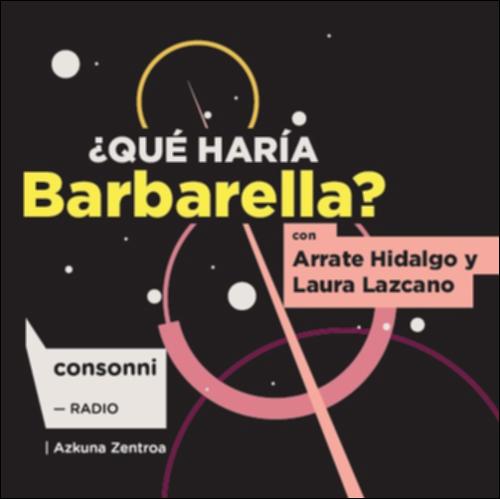
- Title:
- ¿Qué haría Barbarella?
- Programme:
- Resident collective programme (Amphytrion)
- Date:
- 12-03-2019 / 15-10-2019
- Place:
- Atrium of Cultures, floor 0
- Author(s):
- consonni
- Speaker(s):
- Hidalgo, ArrateLazcano, Laura
- Produced by:
- Azkuna Zentroa - Alhóndiga Bilbaoconsonni
- Type:
- Podcast
- Tags:
- Feminism
Science fiction
Contemporary culture - Summary:
- "¿Qué haría Barbarella?", presented by Arrate Hidalgo, is one of the radio programmes framed within consonni radio station, consonni radio with AZ. In this sonic space, the Bilbao feminist science fiction festival co-ordinator and translator Ansible Fest dissects the key topics on current feminism through science fiction. She is accompanied by the critic Laura Lazcano in her section dedicated to audiovisual.
- Description:
PROGRAMS
- #01. Entropy in the kitchen (12/03/2019) - In 1967, the artist and experimental US author Pamela Zoline, broke down with The Thermal Death of the Universe the weariness ‘till delirium of Sarah Boyle, a middle class Californian housewife, key of treaty on entropy. In this first episode we will talk about the domestic space, going through the story and the speculative novel, the archetype of an unhinged housewife in films such as Stepford Wives and the vision of the Xenofeminist Manifesto of the collective Laboria Cuboniks on this topic.
- #02. Relational galaxies (09/04/2019) - The exploration of alternative relationships to monogamy has been a popular field in science fiction since its inception. Based on Marge Piercy's Woman on the Edge of Time, the classic utopian feminist novel, this first episode will look towards polyamory as an element of political speculation. We will also look at the love trios and the various versions that have been given in the examples of state and international speculative, observing the imaginary of sexuality in audiovisual science fiction, we will ask ourselves if we achieve to wriggle out from patriarchy in one of the manifestations of the polyamory most talked of the genre and we will investigate with James Tiptree, Jr. in the most problematic parts of the desire to the alien as Otro. All this crossed by ideas that Brigitte Vasallo picks up in her essay Pensamiento monógamo, terror poliamoroso.
- #03. Sidereal intimism (07/05/2019) - In this third episode we follow the tale of the tradition that puts women at the centre of the intimate drama and explore the fictions that have transported that drama to extra planetary dimensions. We look specifically at the forms that maternity and marital relationships take in literary science fiction, paying special attention to the production in the Spanish-speaking world by the Cuban author and academic Maielis González. Laura Lazcano presents the external space in the audio-visual as a scenario of conflicts codified in the feminine.
- #04. Radioactive Test Tubes (18/06/2019) - How many of us are able to name a female scientist other than Marie Curie? Where are the female doctors Frankenstein, Jekyll, or Strangelove? Were they forgotten like so many other women, erased from the history of science by their male colleagues, husbands, or mentors? In this episode we will be delving into the genealogy of family scientists who inhabit the speculative gender and their different relations with patriarchal society from Western science, with special emphasis on the novel Life, by Gwyneth Jones. On an audiovisual level, Laura Lazcano will review the figure of the female scientist in the 1950s B films and her progression in current films. Throughout this review we will be using as backup the essay by S. García Dauder and Eulalia Pérez Sedeño entitled The ‘Scientific Lies’ about Women, together with our special guest, the Mexican authoress Gabriela Damián Miravete, winner of the 2018 Tiptree Award with her story They will dream in the garden
- #05. Through queer time (16/07/2019) - On the occasion of the LGBTQ + pride, which marked this past June the 50th anniversary of the Stonewall revolts, in this fifth episode we immerse ourselves in the speculative fiction that explores and practices what is queer. We start from Le Guin's classic The Left Hand of Darkness, and the limitations of this concrete reimagining of the genre, aided by Monique Wittig's The Straight Thought. We review gay urban genealogy in the work of New Yorker Samuel Delany and draw links between his writing and the queer and decolonial reflections of Hiromi Goto through what the theorist Jack Halberstam calls "queer time". Laura Lazcano brings us early examples of queer science fiction in the cinema of the 70s and 80s, the New Queer Cinema and its exponents, and tells us how transsexuality is reflected in current fiction. We also listen to some of the young bisexual voices of the current state-of-the-art fantasy and investigate the speculative potential of Spanish-speaking transfeminism thinking.
- #06. Interplanetary Killjoys (16/10/2019) - In this episode we will be taking a walk along the extra planetary boundaries of humour from fragments of the short story Unpronounceable (Aqueduct Press), by US author Susan DiRende. We will also be chatting about humour as a tool through a gender kaleidoscope with author Almijara Barbero Carvajal, co-publisher of the anthology Maldita la gracia (Cerbero), and we will be asking one of her chosen authors, Eva Duncan, why Murcia. From Lazcano’s armchair we will be finding out the relationship between science fiction comedy and sex in European and US films. We will tiptoe through the link between comedy and censorship in the story behind the tale Gu ta gutarra by the Argentinian Magdalena Mouján Otaño, and we will explore how happiness orbits all of this at the hand of feminist killjoy archetype, defined by philosopher Sara Ahmed in her essay The Promise of Happiness (Caja Negra).
- Related activities:
- consonni radio with Az
- Appears in Collections:
- AZ Irratia - Contemporary culture
Documentation:

